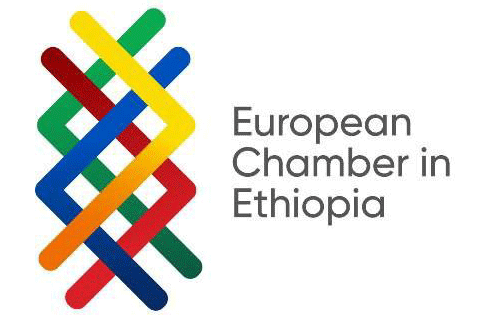
EuroCham Networking Event Discusses New Income Tax Law
At EuroCham Ethiopia’s 11th networking event, Ministry of Finance representatives Mr. Wassihun Abate and Mr. Mulay Weldu outlined the key provisions and business implications of Income Tax Proclamation No. 1395/2025, focusing on compliance, incentives, and Ethiopia’s broader tax reform agenda.
EuroCham Ethiopia convened its 11th networking event on October 14,2025 to examine Income Tax Proclamation No. 1395/2025, drawing senior officials, business leaders, and legal experts into a detailed discussion on the implications of the country’s latest tax reforms. The event focused on how the law will affect compliance, administration, and corporate operations.
The key speakers at the event were Mr. Wassihun Abate, Advisor to the Minister of Finance, and Mr. Mulay Weldu, Head of the Tax Policy Department, who have played key roles in the reform process. They outlined the government’s rationale for the amendment, noting that Ethiopia’s tax-to-GDP ratio has declined for over a decade, falling from 13 percent to about 6.3 percent. The Ministry has now developed a medium-term revenue strategy combining tax policy and administrative reforms aimed at broadening the tax base, digitizing administration, improving efficiency, and curbing evasion. It was disclosed that only 37 percent of registered taxpayers make regular payments, while 67 percent consistently file nil or loss returns.
The new proclamation introduces a series of structural and procedural changes intended to modernize the tax system. The law streamlines taxpayer categories, merges classifications, expands taxation of the digital economy, and revises the definition of permanent establishment to cover foreign companies operating in Ethiopia for more than 91 days. Employment income thresholds have been raised, with the monthly exemption increasing from 300 to 2,000 birr, while individuals earning up to 24,000 birr annually are now exempt. Capital gains tax has been unified at 15 percent for both shares and buildings, down from 30 percent on share gains, and the law introduces a 30 percent inflation adjustment on share transfers before applying the rate. Indirect transfer rules were added so that offshore share sales which effectively transfer ownership of Ethiopian companies are taxed locally. Non-resident withholding rates were revised upward, with dividends increasing from 10 to 15 percent and interest from 5 to 10 percent,
One of the most debated provisions was the introduction of a 2.5 percent Minimum Alternative Tax on sales, designed to ensure a minimum level of contribution from all registered taxpayers. The speakers said the rate was derived from actual data and reflects an average corporate profit margin of around 8.5 percent. Taxpayers will be allowed to credit the minimum tax against future income tax liabilities over five years when profits exceed 2.5 percent of sales. While the law does not allow different rates across sectors, the speakers said an upcoming regulation will clarify exceptions for sectors where margins are government-regulated and for commission-based businesses.
The proclamation also introduces quarterly installment payments, aligning tax payments with the actual earning cycle of businesses. Overpayments will be refunded, financed partly by 10 percent of VAT collections retained for that purpose. Companies with multiple business lines are now required to keep separate books for each activity, consolidating only taxable income and not losses, a measure intended to improve transparency and close loopholes. The speakers acknowledged practical challenges for sectors such as logistics that issue combined invoices, noting that the regulation will provide further guidance.
Changes to investment incentives were another major theme. A new standalone tax incentive regulation has been established, centralizing all approvals under a digital single-window system that reduces processing time to about 24 hours. Ethiopian Investment Incentive Directive 1064/2025 clarifies that customs exemptions for capital goods and inputs apply only before a business license is issued, ending the previous practice of granting exemptions after companies were already operational. The speakers said horticulture investors received a one-time transition period, while future incentives will focus on targeted investment capital allowances rather than open-ended tax holidays.
Participants also raised concerns about consistency, valuation, and alignment with international accounting standards. The speakers said a revised customs valuation directive is under preparation, alongside amendments to the customs proclamation to improve treatment of declared transaction values. They confirmed that the Ministry of Finance will introduce a binding advance-ruling mechanism to strengthen predictability and reduce conflicting interpretations between agencies.
Businesses questioned the low income-tax exemption threshold of 2,000 birr, arguing that it remains out of step with living costs. The speakers said any adjustment depends on fiscal space, given that employment income tax accounts for a large share of regional revenues.
Manufacturers and distributors voiced concern that the minimum tax assumes an 8.55 percent profit margin, which they said exceeds average distribution margins. The speakers reiterated that different rates cannot be introduced by law but agreed to continue consultations to assess the regulation’s impact on the value chain.
The speakers confirmed that the proclamation is already in force and that implementing regulations are being finalized before submission to the macroeconomic committee. The drafts will then be released for public consultation. EuroCham Board Chair expressed the chamber’s openness to facilitate private-sector feedback through written and in-person submissions.
The evening closed with a call for continued dialogue between the government and business community. EuroCham urged its members to actively participate in the consultation process to ensure that Ethiopia’s tax reforms are implemented in a way that balances fiscal objectives with private-sector competitiveness.
latest News
EuroCham Launches a New Office and FDI Incubation Center
February 1, 2026
EU and EuroCham Sign Grant to Boost Ethiopia’s FDI competitiveness
November 22, 2025
EuroCham Urges Reconsideration of EUDR Timeline
September 29, 2025
EuroCham Conducted Technical Discussions with Outgoing NBE Governor
September 17, 2025










